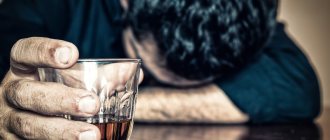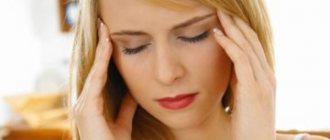Depression is a serious illness caused by disturbances in normal biochemical processes in the body. Therefore, fighting depression with willpower alone is useless. You can just as successfully try to get rid of the infection using self-hypnosis. After a diagnosis has been made, it is extremely important to follow all doctor’s orders and take medications as prescribed. Under no circumstances should you self-prescribe medications, such as sedatives or sleeping pills. This may make the situation worse.
It's no secret that people are exposed to various stresses every day. With age, a person finds less and less joy in his life and its place is gradually taken by sadness, which will ultimately lead to depression, which can ruin relationships with loved ones, as well as harm one’s health or, even worse, commit suicide.
Sadness and sadness are normal emotional states of every person, which disappear after a few hours or days, and then negative emotions are replaced by positive ones. A bad mood can sometimes be accompanied by lethargy and low self-esteem, but if it lasts long enough, the development of depression can be suspected.
The formation of depression is promoted by causes that can be characterized by different symptoms, but if the diagnosis is made correctly, the chance of positive treatment increases. A large number of people suffer from depression in today's world. Clients are turning to psychologists and psychotherapists with this problem more and more often every day. Moreover, many today no longer consider this diagnosis to be something shameful. A person can safely admit his illness to his family and friends.
Depression is a mental disorder that is characterized by strong and sometimes irreversible changes in the body. This is a much more complex and severe condition than is generally believed.
If a person has fallen into a state of real clinical depression, he most likely will not get out of it on his own, therefore treatment of depression should be carried out with the help of specialist psychologists and psychotherapists.
Symptoms of depression
A person who suffers from depression at a fairly serious stage may experience the following symptoms: feelings of guilt and helplessness, low self-esteem and pessimism. This state lasts almost the entire day, accompanied by loss of interest in work and avoidance of contact with other people. In addition, changes occur in nutrition, a person begins to eat too much or too little. With prolonged depression, a person may think about suicide or even try to commit it.
- despair or feeling of hopelessness - weakness, loss of strength - excessively long sleep or insomnia - reluctance to wake up in the morning - suicidal thoughts - pain, frequent illnesses and malfunctions in the body - panic attacks
As is obvious from the above, people often attribute depression to themselves when in reality they do not have such a deviation. Depression includes bad mood, reluctance to work, disappointment in life or any area of it.
It is important to understand that if a person is seriously worried about any area of his life, if his mood is constantly negative, then even in the absence of clinical depression it is necessary to solve the existing problem.
If all the symptoms and signs of depression coincide, this is a reason to immediately consult a specialist.
The fact is that depression has a negative impact not only on the psychological state, which is also important in life. This disease also affects productivity at work, in social and family life, and on health and the body as a whole. In particular, depression can lead to death, not even through suicide, but through the body’s reluctance to live on.
In addition, even if depression does not lead to fatal consequences such as death or terminal illness, it can cause loss of work, family, friends, social and social life, which can lead to worsening depression or a deterioration in quality of life after recovery.
It's better to fight together
If it is not you yourself who are dealing with depression, but one of your close friends or relatives, it is in your power to help him in the fight against the disease. What should be done for this?
Try to learn as much as possible about the disease in order to understand how someone close to you is feeling now. If you see signs of possible depression in a person, do not under any circumstances diagnose or intimidate him. This is the worst thing you can do. It’s better to leave him a brochure about the disease, offer to take an online questionnaire together to identify hidden depression, and gently lead him to the idea of psychological help. Offer your possible help. For example, many people with depression avoid talking on the phone and don't like going to unfamiliar places. Offer to help make an appointment or accompany you when you visit a therapist. But act very tactfully and do not persist, otherwise this may scare away and alienate the person from you. Create a positive atmosphere around your loved one, but don't overdo it. Excessive fuss, noise and ostentatious fun will increase irritation and anxiety and will not help the healing process. Involve him unobtrusively in everyday activities, playing sports together or going for walks. People with depression get tired very quickly, so don’t force them to do something against their will and let them rest more often. Support your loved one at all stages of treatment, believe in him, praise him even for minimal success. However, do not arrange ceremonies and do not attract undue attention to the treatment process if the person himself does not want it. Do not create “hothouse” conditions around a person and do not protect him from everyday worries and problems. This will only increase his feeling of uselessness and helplessness. Be understanding about the desire to be alone. Do not insist on attending parties, mass events, or crowded places. If your friend or relative begins to express thoughts about the futility of life and possible suicide, under no circumstances leave him alone and contact your doctor as soon as possible.
Remember: treating depression is a long and very difficult marathon. And success in it depends not on speed at the start, but on team support, patience and consistency. But the reward - a returned interest in life and the ability to enjoy it - will pay off all the work and effort a hundredfold.
Types of depression
Depression is divided into three groups based on the origin of the disease, but this division is very simplified, and there can be many causes and some are quite difficult to determine. The first group includes the appearance of the disease in connection with sad events and negative situations in society. Most often this is caused by the death of a relative or loved one, material losses or dismissal from work. This type of depression is called psychogenic.
Typically, psychogenic depression goes away on its own within a couple of months, since it does not require the help of a psychiatrist. If it is prolonged, it is best to consult a doctor.
The second type of disease is endogenous depression. It occurs for no reason and is characterized by a genetic factor. This variety has not been fully studied, but it is known that depression has a cyclical nature. In addition, patients may experience alternating feelings of euphoria and intense sadness.
The third type of depression is caused by various diseases or taking certain medications. For example, the cause of the disease can be improper metabolism, heart disease and others. Some medications can interfere with neural transmission, causing feelings of sadness.
Women and the elderly are at risk
The WHO statistics on depression are staggering. Just think about it: every 20th person on the planet is fighting this disease right now (and that’s a total of more than 350 million people, more than the population of the United States and Canada combined). The disease makes no exceptions; people of any age, gender and material income are susceptible to it. Thus, depression is diagnosed in 5% of children under the age of 10 years, in 10–15% of adolescents 10–16 years old. The disease affects every tenth person over 40 years of age, and every third person over 65 years of age. Women are slightly more susceptible to depression than men, and make up 65–70% of all cases.
In addition to women and older people, high-risk groups include:
people with a low level of education divorced and widowed men and women unemployed social workers: doctors, staff of nursing homes, orphanages, preschool institutions people suffering from chronic diseases (for example, diabetes, heart failure, migraines, hypothyroidism, Alzheimer's, Parkinson's and many others) people who have suffered a traumatic brain injury people whose close relatives (parents, brothers, sisters) suffered from depression young fathers and especially mothers people who receive insufficient or inadequate nutrition or adhere to a strict diet for a long time
Causes of depression
Depression can appear due to improper functioning of biochemical processes, mental problems and human development in society.
1) Biochemical disorders
In order for the human brain to work correctly, biochemical processes must occur in it without disturbances, which involve the transfer of information from one nerve cell to another. If this does not happen as expected, it can provoke the appearance of depressive disorders. Three neurotransmitters play an important role in the course of these processes: serotonin (its task is to control mood and state of consciousness), norepinephrine (released through nerve cells, it is also called the fight hormone) and dopamine (changes in its amount, there is a chance of the formation of schizophrenia, Parkinson’s disease and depression).
2) Social influence
Depression can be caused by prolonged isolation, loneliness, financial problems, death of a loved one, divorce, violence, war or post-surgery.
3) Psyche
Mental problems can also cause depression. They usually arise due to complexes, for example, due to appearance, low self-esteem and others. Also, the reason may be a negative perception of the world and people's relationships. In addition, feelings of guilt and fear of being rejected by society can contribute to the disease.
4) Other reasons
Depression can begin after childbirth and be associated with hormonal changes. The disorder also provokes stress directly during childbirth and the burden of responsibility for your child in the future.
Types of depression and reasons
Depression can have many causes. There are several types of depression for the following reasons:
- Acute depression . This is the most classic manifestation of depression. Such depression occurs as a result of any events that cause unnecessary damage to the human psyche. This can be a tragic event in the patient’s family, or a large-scale tragic event in the world, such as a war. This depression occurs overnight and can also be cured quite quickly, in a few weeks.
— Dysthymia . This is chronic depression. It does not have a strong, acute period and passes slowly, like a chronic disease. Such depression may not even be noticed by a person, since it does not have a sharp beginning and end. Dysthymia occurs from fatigue, constant tension and stress.
- Atypical depression . This type of depression is often difficult to recognize, since its symptoms are even more vague than those of dysthymia. Most often, this condition occurs as a result of improper recovery from acute depression. It is also difficult to treat as the condition becomes permanent. Atypical depression is characterized by changes in body weight (sudden weight loss or obesity), anxiety, and constant drowsiness.
— Bipolar depression . Bipolar depression is also called manic depression. This is the most destructive type of depression. Such depression arises due to the appearance of a certain manic idea that cannot be realized or gotten rid of. In addition to the usual symptoms of depression associated with a feeling of hopelessness, there are hallucinations, panic attacks, and a feeling of mania, that is, a pathological craving for something.
— Seasonal depression . Seasonal depression occurs due to different periods of time, such as seasons. Many people notice spring depression associated with a lack of vitamins, autumn depression associated with a lack of sunlight, and monthly depression associated with a lack of money.
— Psychotic depression . Psychotic depression refers to withdrawal from reality. This type of depression also occurs as a result of acute depression. It is accompanied by hallucinations, a reluctance or fear of communicating with people, imaginary friends or others, and the perception of oneself as someone else (as a famous politician or historical figure). In addition, like any depression, this type is accompanied by a feeling of fear and depression, as well as a feeling of incomprehensibility.
— Postpartum depression . As the name suggests, postpartum depression occurs in women after childbirth. It is associated with hormonal changes in the body of a woman who has given birth, as well as with a sharp change in lifestyle and constant fatigue. It is characterized by drowsiness, weakness, constant feelings of fear and anxiety, as well as feelings of despair.
Biochemical basis of depression
Nerve impulses in the brain are transmitted using special substances - neurotransmitters. This process occurs thanks to special connections between nerve cells called synapses. Mediators such as dopamine, norepinephrine and serotonin are responsible for mood and emotional state. If there is a lack of these intermediaries in transmitting the impulse, the receiving neuron shows its “dissatisfaction.” To prevent this from happening, an increase in the mediator is necessary.
Isolation of a substance that destroys essential neurotransmitters is an indiscriminate process. Therefore, there may be a large number of side effects. Substances that help slow down the reuptake of serotonin help best. This inhibitor is very scarce. In order to save its use, the nerve cell that transmits the impulse takes free serotonin back.
The essence of depression comes down to the fact that there are a lot of receiving neurons, while serotonin binds to them rather slowly. In such a situation, the transmitting nerve cell captures serotonin that has not yet been bound before it is accepted by another neuron.
The essence of treating depression comes down to creating conditions to block reuptake. In this case, the symptoms of the disease disappear. This task is performed by medications called antidepressants. They are also used for other mental disorders such as post-traumatic stress disorder and anxiety.
Consequences of depression
As mentioned above, prolonged depression can lead to suicide. Also, depression is one of the most common reasons for a person to disappear; he simply leaves the house and disappears.
In addition, depression contributes to the deterioration of a person’s social situation, since he has to work or study quite hard, all this puts additional stress on him.
If the disease is not treated with medication for a long time, the body’s sensitivity to drugs weakens, and depression begins to return with renewed vigor. People who have problems with mental disorders resort to the use of sedatives or abuse alcohol, which has a negative effect on the body.
Self-diagnosis of depression
This diagnosis is much broader than bad mood and depression due to difficult events in life. A bad mood will sooner or later be replaced by a more joyful one. The basis of the depressive state is internal factors, therefore external events or phenomena are not the direct cause of the disease. The illness is characterized by a loss of the ability to be satisfied with the existing state of affairs and life in general.
Post-traumatic disorders are often mistaken for depression. Such conditions arise as a result of the influence of exclusively external factors that traumatize the psyche. These include rape, the death of a loved one, an accident, divorce, etc. With such phenomena, people lose the ability to concentrate, their speech may be awkward, the will and purposefulness of actions disappear - these external manifestations are similar to depression, but are not it. Their cause is a severe traumatic situation.
Every person has had moments in his life when he felt mentally ill. Terrible mood, loss of strength, reluctance to do anything, to get up in the morning, a feeling of complete hopelessness - all these conditions are also familiar to everyone.
Having felt this state, people most often self-diagnose depression, and believe that this state is normal and that all people fall into it from time to time. But that's not true. Depression is a mental illness.
Emotional echoes
Depression leaves consequences in the emotional sphere of a person. These include:
- anxious, melancholy state;
- premonition of trouble;
- depression, despair;
- self-criticism;
- irritation;
- tears, hysteria;
- uncertainty;
- negative reaction to the outside world.
In human physiology, the consequences are manifested as follows:
- Normal healthy sleep disappears. A person either cannot sleep or sleeps constantly.
- Appetite changes. A person suffering from depression either does not eat at all or overeats.
- The intestines stop working normally. Constipation occurs.
- The need for sexual activity decreases. A person generally stops paying due attention to her or does it very rarely, as a duty.
- Energy decreases. The patient quickly becomes overtired during normal activities.
- Trembling appears in the hands.
- Pain appears in muscles, joints, and various parts of the body.
Ways to eliminate depression
Depression can be cured, but today there are several ways to get rid of it. The first way is psychiatry, which involves communicating with the patient. The patient talks about his experiences, and the doctor draws appropriate conclusions. The conversation only touches on the patient’s problems and emotions. There are several methods of psychotherapy, including hypnosis.
Antidepressant drugs make up a significant share of the turnover of pharmaceutical companies. They are forced to constantly increase production to meet the need for drugs of this kind. In this regard, it is worth noting the statistics confirming the number of people suffering from this disease. Today, approximately 20% of residents of large cities and megalopolises live with a diagnosis of depression. Treatment with medications is the main method of combating depressive disorders. Only a psychiatrist can prescribe medications. Today there are many antidepressants that differ not only in composition, but also in action and safety for the body.
A common misconception is that medications that fight depression are addictive and can have an stimulating or, conversely, calming effect. This is wrong. They are aimed only at preventing negative biochemical processes that cause depressive states. Such drugs are selected exclusively individually, and the attending physician monitors the patient’s condition for a long time, changing drugs or adjusting the dose.
The main task of drugs is to change mood for the better by influencing neurotransmitters. It is worth noting that taking medications may cause side effects, such as dry mouth, excessive sweating, and drowsiness.
The results of treatment with antidepressants can already be seen within a month. Then treatment is continued in accordance with the recommendations of the psychiatrist, usually for several months. It is important to know that if taken at the beginning of treatment, medications will not have much effect, since it works gradually and the body must get used to it. Changing the dose on your own can harm the treatment, and if you take too large a dose, it can even lead to death.
Phototherapy is also a type of treatment for depression. To eliminate diseases, the patient is irradiated with artificial light every day. This method treats seasonal exacerbations in patients.
Treatment with electricity is based on placing two electrodes on the patient's head and passing current through them for a short time. This leads to chemical changes in the brain, and the symptoms of the disorder disappear for a certain period of time. To avoid discomfort in the patient, he is given anesthesia. This method is quite effective, but most people are scared off because of the old name it received - electric shock. In addition, electrical treatment has virtually no side effects.
If depression is very severe, inpatient treatment is resorted to. In the hospital, the patient is observed, given medications and given individual or group psychotherapy. The hospital staff also monitors to ensure that the patient does not harm himself. Many people refuse hospital treatment because of shame and the opinions of other people, but it is worth knowing that health is the highest value of any person, in addition, there is medical confidentiality and only relatives and the doctor can know about the disease.
Folk remedies
At home, you can easily cope with some symptoms using traditional medicine. Many recipes suppress sadness, improve the functioning of the nervous system and stimulate the production of joy hormones. They should be used in moderation after consulting a doctor.
One of the most popular folk remedies is warm baths with the addition of beneficial substances. It is best to take them in the morning or late evening. It is enough to add a little of the chosen product to a bath filled with warm water and lie in it for half an hour. Essential oils of lemon, lavender and rosemary, juniper, spruce needles, natural honey, myrtle petals, and infusion of poplar buds are especially effective.
Regular massages are highly effective. Carrying them out on your own can be difficult, but if desired, it is quite doable. You just need to massage your body with light, pleasant movements, lubricating your hands with essential oils that have a calming effect.
You can also get rid of prolonged depression with the help of tinctures or decoctions. They should be taken before meals or before bed. Ginseng root, Eleutherococcus, and Rhodiola rosea are considered very useful. Preparations based on Chinese lemongrass, aralia, mint, valerian, lemon balm, hops, motherwort, lavender and peony are no less effective.











